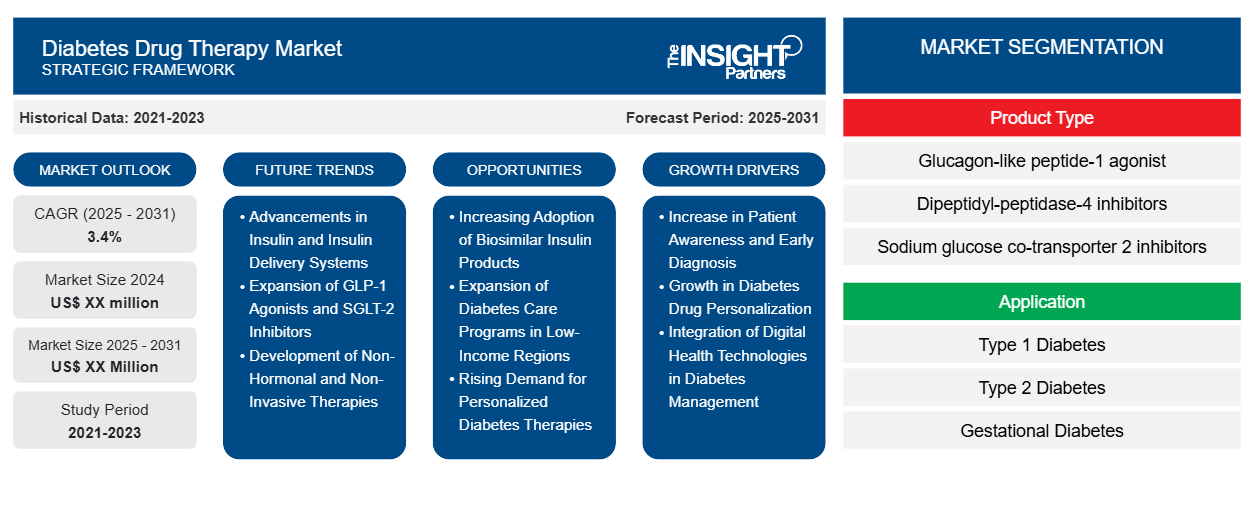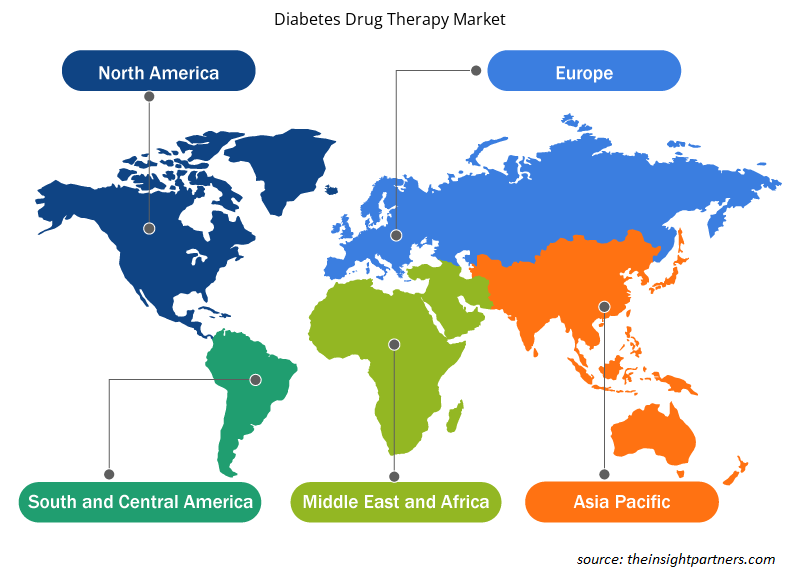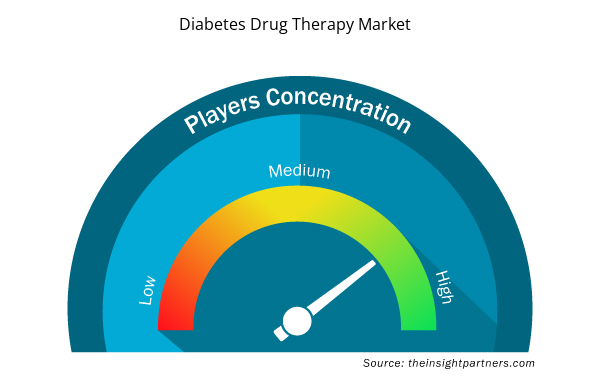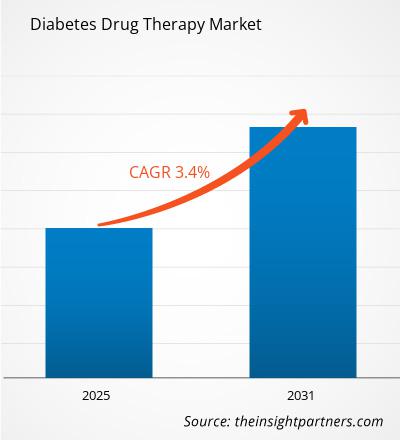The Diabetes Drug Therapy Market is expected to register a CAGR of 3.4% from 2025 to 2031, with a market size expanding from US$ XX million in 2024 to US$ XX Million by 2031.
The report is segmented by Product Type (Glucagon-like peptide-1 (GLP-1) agonist, Dipeptidyl-peptidase-4 (DPP-4) inhibitors, Sodium glucose co-transporter 2 (SGLT2) inhibitors, Insulin, Others); and Application (Type 1 Diabetes, Type 2 Diabetes, Gestational Diabetes, Impaired Glucose Tolerance, Impaired Fasting Glycaemia). The global analysis is broken down at the regional level and for major countries. The market evaluation is presented in US$ for the above segmental analysis.
Purpose of the Report
The report Diabetes Drug Therapy Market by The Insight Partners aims to describe the present landscape and future growth, top driving factors, challenges, and opportunities. This will provide insights to various business stakeholders, such as:
- Technology Providers/Manufacturers: To understand the evolving market dynamics and know the potential growth opportunities, enabling them to make informed strategic decisions.
- Investors: To conduct a comprehensive trend analysis regarding the market growth rate, market financial projections, and opportunities that exist across the value chain.
- Regulatory bodies: To regulate policies and police activities in the market with the aim of minimizing abuse, preserving investor trust and confidence, and upholding the integrity and stability of the market.
Diabetes Drug Therapy Market Segmentation
Product Type
- Glucagon-like peptide-1 agonist
- Dipeptidyl-peptidase-4 inhibitors
- Sodium glucose co-transporter 2 inhibitors
- Insulin
Application
- Type 1 Diabetes
- Type 2 Diabetes
- Gestational Diabetes
- Impaired Glucose Tolerance
- Impaired Fasting Glycaemia
Customize This Report To Suit Your Requirement
You will get customization on any report - free of charge - including parts of this report, or country-level analysis, Excel Data pack, as well as avail great offers and discounts for start-ups & universities
Diabetes Drug Therapy Market: Strategic Insights

- Get Top Key Market Trends of this report.This FREE sample will include data analysis, ranging from market trends to estimates and forecasts.
Diabetes Drug Therapy Market Growth Drivers
- Increase in Patient Awareness and Early Diagnosis: The increasing awareness of diabetes and its early diagnosis presents another substantial growth opportunity for the diabetes drug therapy market. As education campaigns and public health initiatives gain momentum globally, more individuals are becoming aware of the risk factors associated with diabetes, such as obesity, sedentary lifestyle, and family history. This heightened awareness is driving more people to seek early diagnosis and treatment, which is critical for better disease management and preventing complications such as cardiovascular disease and kidney damage. Early diagnosis often leads to a higher likelihood of individuals using diabetes medications and therapies consistently, promoting better long-term health outcomes. The growing focus on preventative healthcare is also encouraging patients to take a proactive approach to managing their condition, which translates into greater demand for effective diabetes therapies. The expansion of screening programs, particularly in high-risk populations, is expected to increase the number of diagnosed patients and, in turn, the number of individuals requiring medication. As more patients seek treatment early in the disease process, pharmaceutical companies can capitalize on the growing demand for new and advanced diabetes drugs, particularly those that focus on early intervention and long-term disease management. This trend offers substantial growth potential for the diabetes drug therapy market worldwide.
- Growth in Diabetes Drug Personalization: Personalized medicine is an emerging trend in the diabetes drug therapy market that presents a significant growth opportunity. Advances in pharmacogenomics and the increasing use of genetic testing are enabling healthcare providers to tailor diabetes treatments to individual patients based on their genetic profile, lifestyle, and response to therapy. Personalized diabetes care is becoming more prevalent, as it allows for more precise and effective treatment strategies, reducing the risk of adverse side effects and improving patient outcomes. For example, certain patients may respond better to specific types of insulin or non-insulin therapies based on their genetic makeup. Personalized treatments also take into account factors such as coexisting health conditions, comorbidities, and treatment history, ensuring that patients receive the most appropriate drug therapies for their unique needs. The rise of precision medicine in diabetes care is also being supported by advancements in artificial intelligence (AI) and machine learning, which are helping clinicians predict how a patient will respond to different drugs. As more healthcare providers adopt personalized treatment protocols, the demand for diabetes medications that can be customized to individual patients will increase. Pharmaceutical companies investing in the development of precision therapies will be well-positioned to tap into this growing market and cater to the increasing demand for personalized diabetes drug treatments.
- Integration of Digital Health Technologies in Diabetes Management: The integration of digital health technologies into diabetes management presents a significant growth opportunity for the diabetes drug therapy market. The increasing use of mobile health apps, wearable devices, and telemedicine platforms is transforming how diabetes is managed, allowing patients to monitor their blood sugar levels, track medication adherence, and receive personalized treatment recommendations remotely. These digital tools enable real-time monitoring and data collection, improving patient engagement and helping healthcare providers make more informed decisions about drug therapy adjustments. For instance, continuous glucose monitoring (CGM) devices and insulin pumps, combined with mobile apps, can help optimize insulin therapy and improve overall glucose control. In addition, telemedicine services are making it easier for patients in remote or underserved areas to consult with healthcare professionals and manage their diabetes without frequent in-person visits. As patients and healthcare systems embrace these digital tools, there will be an increased demand for diabetes drug therapies that can be integrated into these technologies. Pharmaceutical companies that collaborate with digital health companies or develop their own diabetes management platforms will benefit from this growing trend. By incorporating digital solutions into their drug therapies, companies can enhance the effectiveness of their products, improve patient outcomes, and increase market penetration, leading to long-term growth in the diabetes drug therapy market.
Diabetes Drug Therapy Market Future Trends
- Advancements in Insulin and Insulin Delivery Systems: One of the most significant future trends in the diabetes drug therapy market is the continuous advancement in insulin formulations and delivery systems. Traditional insulin therapies, while effective, are being replaced or supplemented with newer, more innovative solutions aimed at improving patient convenience and glycemic control. One example is the development of ultra-long-acting insulin analogs, which provide more stable blood sugar levels over extended periods, reducing the frequency of injections. Additionally, there is significant growth in insulin delivery devices, such as insulin pumps and pens, that are becoming more user-friendly and precise. Continuous glucose monitoring (CGM) systems, paired with insulin pumps, are also transforming diabetes management by enabling real-time adjustments to insulin doses based on current blood sugar levels. The integration of insulin pumps with advanced algorithms for automated insulin delivery (often referred to as an artificial pancreas) is another promising trend. This system mimics the function of a healthy pancreas by automatically delivering insulin as needed, reducing the burden on patients to monitor their glucose levels constantly. As the technology improves and becomes more accessible, these advancements will not only improve patient outcomes but also increase the demand for insulin therapies, positioning the diabetes drug therapy market for significant growth.
- Expansion of GLP-1 Agonists and SGLT-2 Inhibitors: The diabetes drug therapy market is witnessing a shift toward more innovative drug classes, particularly GLP-1 agonists and SGLT-2 inhibitors, which are expected to dominate the future landscape of diabetes treatment. GLP-1 (glucagon-like peptide-1) agonists are injectable medications that not only help control blood sugar levels but also offer cardiovascular benefits, which is particularly important for diabetic patients who are at a higher risk for heart disease. These drugs work by enhancing insulin secretion and reducing glucagon production, leading to better blood glucose control. The market for GLP-1 agonists is expanding as new drugs, such as semaglutide, show strong clinical outcomes and improve patient compliance. Similarly, SGLT-2 (sodium-glucose cotransporter-2) inhibitors are another class of medications gaining popularity due to their ability to lower blood glucose levels and promote weight loss by blocking glucose reabsorption in the kidneys. Additionally, SGLT-2 inhibitors have been shown to reduce the risk of kidney disease and cardiovascular complications in diabetic patients, further increasing their appeal. These classes of drugs are expected to see greater adoption due to their dual benefits for both blood sugar control and overall cardiovascular health. With increasing clinical evidence supporting their effectiveness and safety, GLP-1 agonists and SGLT-2 inhibitors will likely become the first-line therapy for many type 2 diabetes patients in the coming years.
- Development of Non-Hormonal and Non-Invasive Therapies: A promising future trend in the diabetes drug therapy market is the development of non-hormonal and non-invasive therapies. Traditionally, diabetes management has relied heavily on medications that require oral ingestion or injection, such as insulin and oral hypoglycemic agents. However, there is growing interest in the development of non-invasive therapies that could provide patients with more convenient and less disruptive alternatives. Research into non-hormonal therapies, including new oral drugs and injectable formulations, is gaining traction. These therapies aim to manage diabetes through mechanisms other than insulin secretion or sensitivity. In addition, the growing interest in non-invasive treatments, such as insulin patches, inhaled insulin, and wearable glucose monitors, could revolutionize diabetes management. These innovations aim to minimize the need for traditional injections and reduce the burden of constant glucose monitoring. The emergence of oral insulin, which is currently undergoing clinical trials, is another potential breakthrough. Non-invasive treatments are likely to improve patient adherence, as they eliminate the pain and inconvenience associated with injections and blood sugar testing. As these therapies move closer to commercialization, the diabetes drug therapy market will experience a shift toward more user-friendly treatment options that enhance the overall patient experience and contribute to better disease management.
Diabetes Drug Therapy Market Opportunities
- Increasing Adoption of Biosimilar Insulin Products: One significant growth opportunity in the diabetes drug therapy market is the increasing adoption of biosimilar insulin products. With the expiration of patents for several insulin formulations, the market is witnessing a surge in the development and commercialization of biosimilars—biologically similar versions of branded insulins. These biosimilars offer an opportunity for healthcare systems to reduce treatment costs while providing patients with effective alternatives. The introduction of biosimilar insulins is particularly relevant in regions with a high burden of diabetes, such as the United States, Europe, and parts of Asia-Pacific, where high-cost branded insulins limit access to care. Biosimilar insulins are expected to increase competition and reduce overall healthcare expenditure, making diabetes treatments more affordable and accessible. Furthermore, as these products undergo rigorous clinical testing and regulatory approval, they offer a promising solution to improve insulin therapy adherence and overall treatment outcomes. The cost-effectiveness of biosimilars can encourage healthcare providers to prescribe insulin more widely, leading to better glycemic control in patients with both type 1 and type 2 diabetes. As biosimilar insulin products continue to gain approval and market acceptance, pharmaceutical companies involved in their development and distribution will benefit from the growing demand in the global market.
- Expansion of Diabetes Care Programs in Low-Income Regions: The expansion of diabetes care programs in low-income and underserved regions presents a major growth opportunity for the diabetes drug therapy market. Diabetes is becoming a global epidemic, and its prevalence is increasing, especially in developing countries where healthcare infrastructure and awareness are often limited. Many low-income regions face a shortage of trained healthcare providers, and there is insufficient access to essential diabetes medications. However, with the growing recognition of the need for better diabetes care in these areas, governments, NGOs, and international organizations are prioritizing the establishment of comprehensive diabetes care programs. These programs typically focus on improving access to diabetes education, early diagnosis, and affordable medication. By partnering with public health organizations and governments, pharmaceutical companies have the opportunity to expand their reach into these regions and offer cost-effective therapies that can be included in these diabetes care initiatives. The increasing availability of generic drugs and biosimilars is expected to play a key role in making diabetes medications more affordable in these regions. Furthermore, public-private partnerships in diabetes care programs can help bridge the gap in access to essential drugs, thereby driving demand for diabetes therapies and contributing to market growth. As these programs evolve, they will create new opportunities for companies to reach untapped markets, further boosting global demand for diabetes drugs.
- Rising Demand for Personalized Diabetes Therapies: Personalized or precision medicine is gaining traction in the diabetes drug therapy market, offering a significant growth opportunity for pharmaceutical companies. As healthcare becomes increasingly tailored to individual patient needs, the demand for personalized diabetes treatments is expected to rise. This trend is driven by advancements in genetic testing, which enable healthcare providers to better understand how different patients respond to specific diabetes drugs. With the ability to identify genetic markers, lifestyle factors, and other variables, healthcare providers can choose the most effective treatment for each patient, rather than relying on a one-size-fits-all approach. Personalized therapies can range from specific insulin formulations to new classes of oral drugs, such as GLP-1 agonists and SGLT-2 inhibitors, that address unique aspects of diabetes pathophysiology. As precision medicine continues to evolve, more targeted therapies will emerge, allowing for better blood sugar control and reduced risk of complications. This shift toward individualized treatment plans is expected to improve patient outcomes and satisfaction, as well as reduce the likelihood of adverse reactions. For pharmaceutical companies, the ability to offer personalized diabetes drug therapies provides a valuable opportunity to differentiate their products in an increasingly competitive market. By investing in genetic research and innovative drug development, companies can tap into this growing demand for personalized diabetes care.
Diabetes Drug Therapy Market Regional Insights
The regional trends and factors influencing the Diabetes Drug Therapy Market throughout the forecast period have been thoroughly explained by the analysts at Insight Partners. This section also discusses Diabetes Drug Therapy Market segments and geography across North America, Europe, Asia Pacific, Middle East and Africa, and South and Central America.

- Get the Regional Specific Data for Diabetes Drug Therapy Market
Diabetes Drug Therapy Market Report Scope
| Report Attribute | Details |
|---|---|
| Market size in 2024 | US$ XX million |
| Market Size by 2031 | US$ XX Million |
| Global CAGR (2025 - 2031) | 3.4% |
| Historical Data | 2021-2023 |
| Forecast period | 2025-2031 |
| Segments Covered |
By Product Type
|
| Regions and Countries Covered | North America
|
| Market leaders and key company profiles |
Diabetes Drug Therapy Market Players Density: Understanding Its Impact on Business Dynamics
The Diabetes Drug Therapy Market market is growing rapidly, driven by increasing end-user demand due to factors such as evolving consumer preferences, technological advancements, and greater awareness of the product's benefits. As demand rises, businesses are expanding their offerings, innovating to meet consumer needs, and capitalizing on emerging trends, which further fuels market growth.
Market players density refers to the distribution of firms or companies operating within a particular market or industry. It indicates how many competitors (market players) are present in a given market space relative to its size or total market value.
Major Companies operating in the Diabetes Drug Therapy Market are:
- Abbott Laboratories,
- Mannkind Corporation,
- Bristol Myers Squibb,
- Medtronic,
- AstraZeneca,
- Eli Lilly and Company,
Disclaimer: The companies listed above are not ranked in any particular order.

- Get the Diabetes Drug Therapy Market top key players overview
Key Selling Points
- Comprehensive Coverage: The report comprehensively covers the analysis of products, services, types, and end users of the Diabetes Drug Therapy Market, providing a holistic landscape.
- Expert Analysis: The report is compiled based on the in-depth understanding of industry experts and analysts.
- Up-to-date Information: The report assures business relevance due to its coverage of recent information and data trends.
- Customization Options: This report can be customized to cater to specific client requirements and suit the business strategies aptly.
The research report on the Diabetes Drug Therapy Market can, therefore, help spearhead the trail of decoding and understanding the industry scenario and growth prospects. Although there can be a few valid concerns, the overall benefits of this report tend to outweigh the disadvantages.
- Historical Analysis (2 Years), Base Year, Forecast (7 Years) with CAGR
- PEST and SWOT Analysis
- Market Size Value / Volume - Global, Regional, Country
- Industry and Competitive Landscape
- Excel Dataset


- Electronic Shelf Label Market
- Small Molecule Drug Discovery Market
- Third Party Logistics Market
- Advanced Planning and Scheduling Software Market
- Pressure Vessel Composite Materials Market
- Travel Vaccines Market
- Wind Turbine Composites Market
- Fishing Equipment Market
- Energy Recovery Ventilator Market
- Artificial Intelligence in Defense Market

Report Coverage
Revenue forecast, Company Analysis, Industry landscape, Growth factors, and Trends

Segment Covered
This text is related
to segments covered.

Regional Scope
North America, Europe, Asia Pacific, Middle East & Africa, South & Central America

Country Scope
This text is related
to country scope.
Frequently Asked Questions
The Diabetes Drug Therapy Market is estimated to witness a CAGR of 3.4% from 2025 to 2031.
The major factors driving the Diabetes Drug Therapy Market are Increase in Patient Awareness and Early Diagnosis, Growth in Diabetes Drug Personalization, and Integration of Digital Health Technologies in Diabetes Management
Future trends in the Diabetes Drug Therapy Market are Advancements in Insulin and Insulin Delivery Systems, Expansion of GLP-1 Agonists and SGLT-2 Inhibitors, and Development of Non-Hormonal and Non-Invasive Therapies.
Some of the players operating in the market are Abbott Laboratories, Mannkind Corporation, Bristol Myers Squibb, Medtronic, AstraZeneca, Eli Lilly and Company, GlaxoSmithKline, Sanofi, Novo Nordisk, Novartis International AG.
The report can be delivered in PDF/PPT format; we can also share an excel datasheet based on the request.
Some customization options available based on the request are an additional 3–5 company profiles and a country-specific analysis of 3–5 countries of your choice. Customizations are to be requested/discussed before making final order confirmation# as our team would review the same and check the feasibility.
Trends and growth analysis reports related to Life Sciences : READ MORE..
1. Abbott Laboratories
2. Mannkind Corporation
3. Bristol Myers Squibb
4. Medtronic
5. AstraZeneca
6. Eli Lilly and Company
7. GlaxoSmithKline
8. Sanofi
9. Novo Nordisk
10. Novartis International AG

 Get Free Sample For
Get Free Sample For